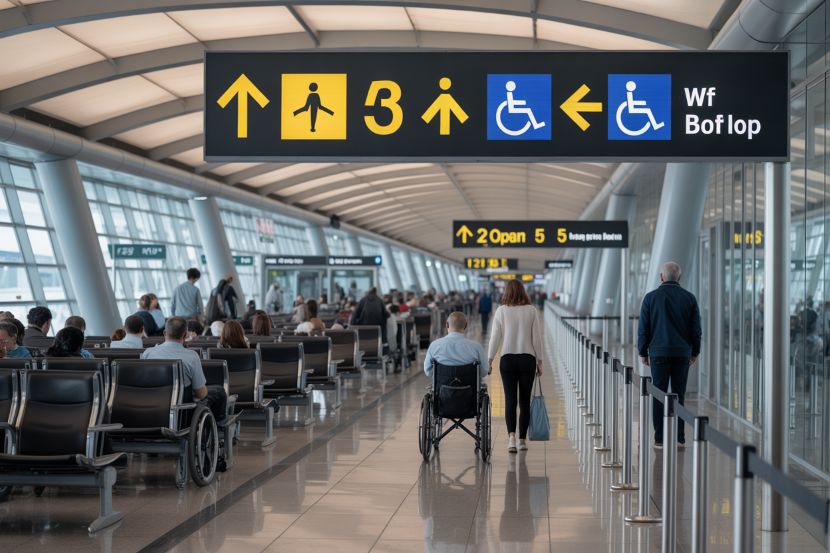Published on
November 1, 2025

The Directorate General of Civil Aviation (DGCA) in India has introduced a controversial change in the rules for wheelchair services at airports. Under the new guidelines, airlines now have the authority to charge able-bodied passengers who opt to use wheelchair services at airports. The decision follows several complaints from the public, with the regulator seeking to improve the management of mobility assistance for travelers.
This new policy, which updates the Civil Aviation Requirements (CAR) related to the Carriage by Air – Persons with Disabilities and those with reduced mobility, aims to better allocate resources at airports. It also introduces measures to streamline assistance for passengers who genuinely need mobility support.
The New Policy for Wheelchair Services
In line with this policy shift, the DGCA has revised its guidelines, specifying that airlines may charge an assistance fee for wheelchair services used by passengers without disabilities. This fee will be clearly displayed on the airline’s website, ensuring transparency. This change is designed to manage the limited availability of assistance resources, addressing complaints of misuse and ensuring that services are provided in a timely manner.
Moreover, the new rule emphasizes the need for passengers to notify the airline well in advance if they require mobility assistance. Airlines may also set specific times for passengers to request such services based on airport infrastructure and other operational constraints, aiming for smoother operations at terminals.
Accessibility Guidelines for Airports
While airlines are responsible for providing wheelchairs, the airport operators are required to provide additional support where necessary. This could involve supplying extra wheelchairs at critical locations or ensuring the availability of accessible seating near designated assistance counters.
Airport authorities must also adhere to specific accessibility standards by clearly marking areas reserved for passengers with mobility issues, such as special drop-off points and wheelchair-accessible seating. These measures are intended to make the entire airport experience more seamless and accessible for travelers requiring assistance.
To enhance accessibility further, airports are mandated to place clear and visible signage in key locations, ensuring that both passengers and airport staff can easily identify areas designated for persons with disabilities.
The Rationale Behind Charging Able-Bodied Passengers
The decision to charge able-bodied passengers for using wheelchair services has sparked some debate. The primary concern addressed by the DGCA is the misuse of these resources. By introducing this fee, the regulator hopes to ensure that wheelchair assistance is primarily available for passengers who genuinely need it. Additionally, the new guidelines are expected to improve resource management, ensuring that airports can provide mobility support efficiently.
Another reason for this policy change is the ongoing pressure to ensure that all passengers receive timely assistance, with airports facing growing demand for these services. Airlines and airport operators must now ensure that resources are allocated appropriately to meet both passenger needs and operational constraints.
Travel Tips for Passengers
With the new changes in place, it’s important for travelers to be aware of how the wheelchair services policy may affect their travel experience, especially if they don’t have a disability but may require assistance at the airport.
- Notify Your Airline Early: If you expect to need mobility assistance, it’s advisable to inform your airline well in advance of your flight. This will help ensure a smoother check-in and boarding process.
- Check for Charges: As airlines will now be charging for wheelchair use by able-bodied passengers, make sure to check the airline’s website for the relevant fees and ensure that you are aware of any extra charges before booking your flight.
- Know Your Rights: Airlines are still required to offer free carriage for assistive devices, so passengers should not be charged for carrying their own mobility aids.
- Consider Alternatives: If you don’t require a wheelchair but need some extra assistance, consider asking the airline about other forms of support, such as priority boarding or assistance through security.
- Check Airport Facilities: Make sure the airport you are traveling through has adequate facilities for those with mobility needs, including clear signage and accessible seating.
Future Implications for Travelers
The changes in India’s aviation regulations are likely to be felt across the broader travel industry. The introduction of an assistance fee for wheelchair services will have an impact not only on Indian passengers but also on international travelers passing through Indian airports. As airlines and airports adapt to the new rules, passengers may find that additional fees or service changes become standard across airports worldwide.
The hope is that these revised policies will create a fairer and more efficient system for mobility assistance, benefitting those who truly need the help while addressing the challenges of limited resources in the aviation sector.







